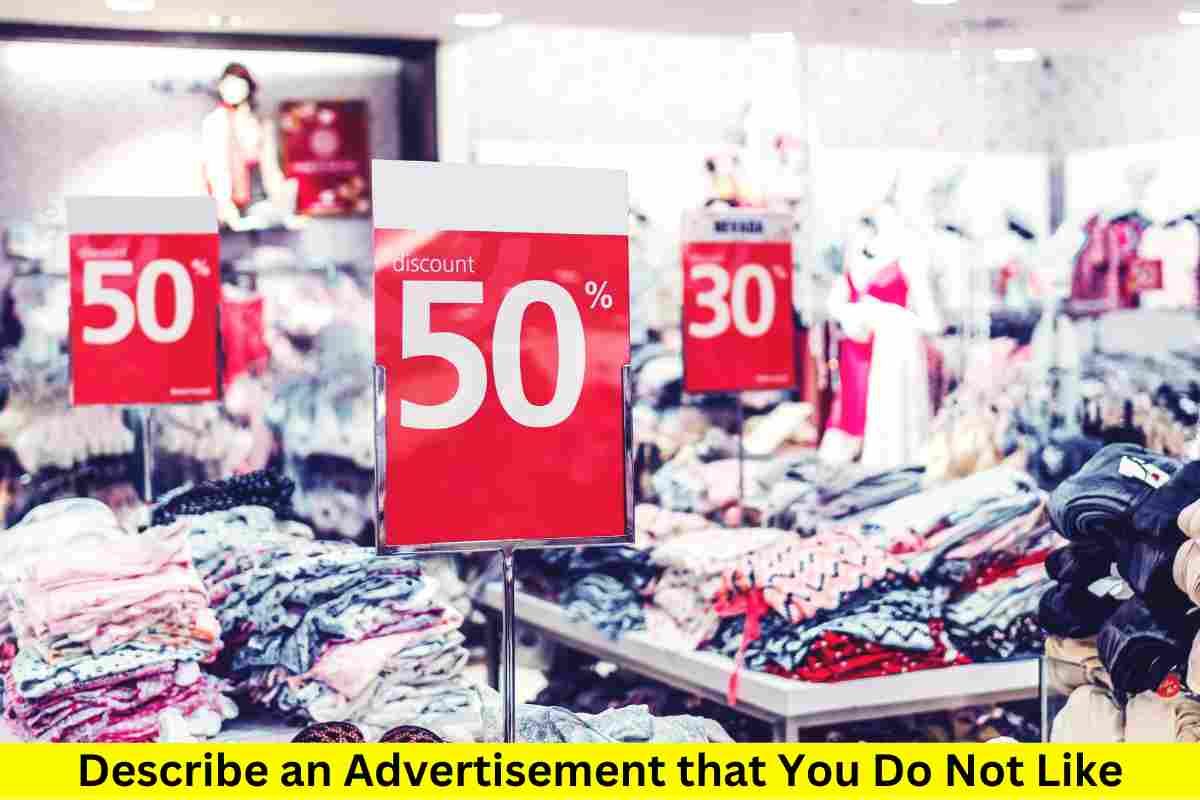Describe an Advertisement that You Do Not Like.
- When did you see it?
- What is it about?
- Where did you see it?
- How did you come to know about it?
- Why didn’t you like it?
Sample 1:- Describe an Advertisement that You Do Not Like
Certain portrayals occasionally strike a discordant note in the vast sea of advertisements, eliciting more discomfort than intrigue. One such advertisement, which I found particularly unsettling, came across my screen while I was watching a popular YouTube channel around six weeks ago.
The advertisement was for a hair growth serum. It depicted a young man, clearly distressed about his thinning hair, facing rejections in job interviews and social circles. However, upon using the product, not only does he regain a lush mane, but also, quite unbelievably, a newfound success in both professional and personal spheres. The tagline proclaimed, “More than just hair growth.”
My objections to this advertisement stem from its overt implications. To begin with, it dangerously insinuates that a person’s competence, especially in professional settings, is linked to physical attributes like hair density. This perpetuates superficial judgments and amplifies insecurities among viewers who might be grappling with similar concerns. Moreover, the oversimplified narrative that personal and professional triumphs hinge on one’s appearance is both unrealistic and misleading.
Furthermore, the exaggerated before-and-after transformation, a common trope in many ads, tends to set up unrealistic expectations, which can lead to potential disillusionment among consumers.
While the product might offer genuine benefits, the advertisement’s narrative was undeniably flawed. As advertisements shape societal perspectives, it’s imperative that they are crafted with sensitivity, accuracy, and a touch of realism.
Sample 2:- Describe an Advertisement that You Do Not Like
Despite their commercial intent, advertisements often weave into the fabric of our daily experiences. However, not all resonate positively. I vividly recall an advertisement that left me rather angry, which I viewed during the commercial break of a renowned talk show about two months ago.
The advertisement was for a brand of instant noodles. The setting was a home, where a seemingly tired mother hands her child a packed lunchbox. On opening it at school, the child finds it filled with the advertised noodles and is surrounded by envious peers. The ad concludes with the mother being lauded at a PTA meeting for her ‘innovative’ lunch choice, with the tagline, “Making mothers heroes.”
My discomfort with this advertisement arises from several angles. Firstly, the portrayal of instant noodles, a product often critiqued for its nutritional value, as a commendable lunch choice for children is questionable. Such an endorsement, especially in a society grappling with childhood obesity and health issues, seems irresponsible. Additionally, the narrative that a mother’s worth or recognition is tied to her child’s lunchbox content is reductive, overlooking mothers’ multifaceted roles.
Moreover, as seen in the envious classmates, the emphasis on peer validation seems to propagate a message that social approval is paramount, even in something as simple as lunch choices.
In conclusion, while the advertisement was catchy and well-produced, its underlying message was fraught with issues. Advertisers bear a significant responsibility, and it’s essential that their content is both engaging and socially conscientious.
Sample 3:- Describe an Advertisement that You Do Not Like
Advertisements, designed to inform and allure, occasionally misfire by straying into contentious or insensitive terrains. One such advertisement, which I found particularly off-putting, was broadcast on television during prime time, approximately three weeks ago.
The advertisement was for a brand of luxury watches. It showcased a bustling airport where travelers were depicted in two groups: one wearing the advertised watch, breezing through check-ins and lounges with an air of superiority, and the other, without the watch, facing minor inconveniences. The climax revealed a tagline, “Time is luxury, wear it.”
Also, Read Describe an Actor or Actress Whom You Admire
My reservations with this advertisement are multifold. Firstly, the insinuation that one’s travel experience, or broader life experiences, could be dramatically enhanced by a mere accessory is overly simplistic and fosters materialistic aspirations. Such a portrayal could inadvertently encourage viewers, especially the younger demographic, to prioritize material possessions as markers of success or convenience. Additionally, the dichotomy created between those who own the product and those who don’t subtly promotes a divisive and elitist mindset, suggesting that luxury is not just a privilege, but a means to superiority.
Moreover, the overarching theme that personal worth or societal standing is intertwined with material possessions is problematic in itself.
To sum it up, while the advertisement was cinematically appealing, its core message raised concerns. In an era where advertisements significantly shape societal values, it’s crucial for such content to be ethically grounded and socially responsible.
Sample 4:- Describe an Advertisement that You Do Not Like
By virtue of their omnipresence, advertisements have a profound ability to shape our perceptions. Yet, not every advertisement resonates positively. I distinctly recall one such ad that I found deeply problematic, which I encountered during a YouTube binge about seven weeks ago.
The advertisement was for a new brand of shoes, particularly targeting the youth. The scene unfolded in a college setting where students were segregated: those wearing the advertised shoes lounged in elite groups, exuding confidence, while the rest appeared on the periphery, looking sad and isolated. As the narrative progressed, a student, upon donning these shoes, was instantly transformed from an outsider to the center of attention. The concluding tagline was, “Step into the elite.”
My discomfort with this advertisement stemmed from its underlying implications. The blatant suggestion that societal acceptance or popularity is contingent upon material choices, in this case shoes, is both misleading and reinforces superficial judgments. Such a narrative can amplify insecurities among the youth, subtly implying that their worth is tethered to external possessions. Additionally, the depiction of elitism, especially in educational settings, seems tone-deaf, given the ongoing conversations around inclusivity and mental well-being.
Furthermore, the ad’s blatant disregard for individuality, suggesting a monolithic path to acceptance, is concerning.
While the ad was visually striking and memorable, its foundational message was troubling. Given their influential platform, advertisers ought to ensure that their narratives are grounded in values that uplift rather than divide.
Sample 5:- Describe an Advertisement that You Do Not Like
Advertisements, being ubiquitous, play a pivotal role in shaping societal perceptions. However, there are times when their messaging misses the mark. I remember one such advertisement that struck a discordant chord with me, which I saw during a commercial break of a televised cricket match around a month ago.
The advertisement was promoting a brand of energy drinks. The narrative revolved around an office setting where employees were portrayed in two distinct lights: those consuming the drink appeared energetic, taking charge of meetings and impressing their superiors, while those who didn’t looked lethargic, often becoming the butt of jokes. The punchline was, “Fuel your success.”
Several elements of this advertisement troubled me. Firstly, the implicit suggestion that professional success and competence are solely determined by one’s physical energy, as supposedly provided by the drink, is both reductive and misleading. This oversimplification could set unrealistic expectations for viewers, especially young professionals entering the workforce. Furthermore, portraying non-consumers as subjects of ridicule felt inconsiderate, perpetuating a culture where mocking colleagues is normalized.
Moreover, the advertisement’s failure to mention a balanced diet and natural sources of energy, while solely promoting an artificial drink, was another point of contention for me.
In summation, while the advertisement might have been crafted to be memorable, its core message was, in my opinion, problematic. Given the profound influence of advertising on societal norms, it’s essential that content is both engaging and ethically sound.


Leave a Reply